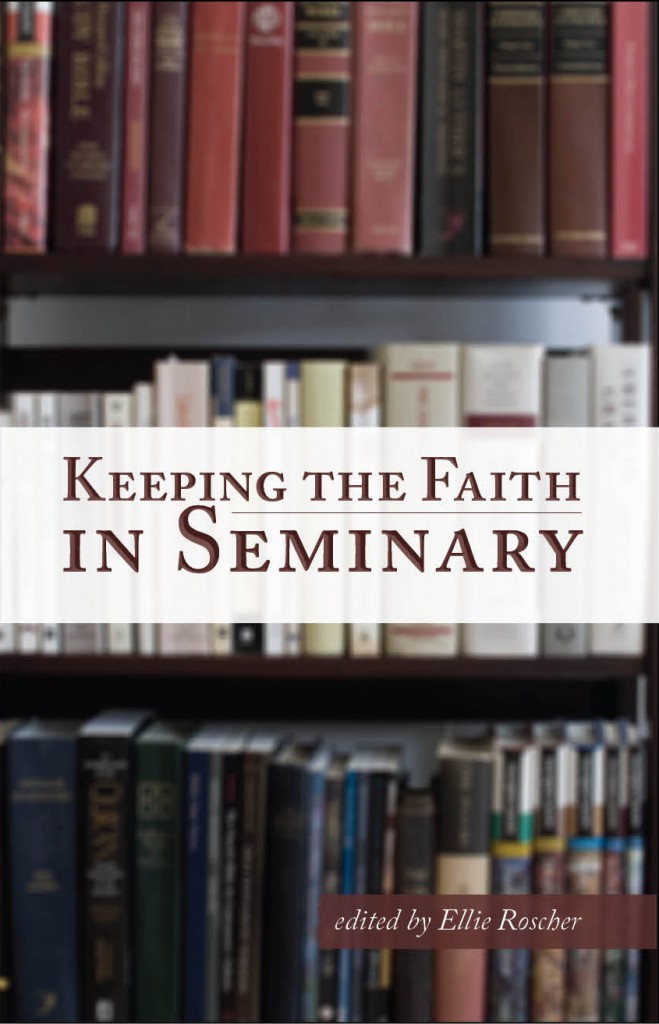 Keeping the Faith in Seminary is a small volume of essays that explores the issues that come with pursuing that Master of Divinity or Master of Arts in Religion. The essays themselves range from gently humorous and encouraging to the contemporary seminary to frustrated scolding of committees and one-size-fits-all tracks. The ink on my own M.Div is dry, but only just and I serve on my synod's candidacy committee. Thus, I read this book with an eye toward encouraging theological vocations, a way to explain seminary to those who may be curious, and perhaps a way to improve the church's system of training our future leaders of all sorts.
Keeping the Faith in Seminary is a small volume of essays that explores the issues that come with pursuing that Master of Divinity or Master of Arts in Religion. The essays themselves range from gently humorous and encouraging to the contemporary seminary to frustrated scolding of committees and one-size-fits-all tracks. The ink on my own M.Div is dry, but only just and I serve on my synod's candidacy committee. Thus, I read this book with an eye toward encouraging theological vocations, a way to explain seminary to those who may be curious, and perhaps a way to improve the church's system of training our future leaders of all sorts.While all the essays are good in their own way, there are a couple stand-outs:
Rachel Wind's essay "Unclogging the Pipes" laid out how easy it is for people to assume a love of church and an exhibition of ministry skill is evidence of a call to ordination. Wind describes her love of church and seminary community and her slow realization that the work she loved was serving within that community, not within a parish setting. This made me think about the benefits of theological education and the community that frequently comes with that education can often serve as their own ends, not means for purposes of church.
Mary Hinkle Shore wrote a powerful essay about what it means to undo in mind and body the lessons and practices that were carefully imparted, with good intention, in seminary teaching. ("Never Stop Unlearning") Some of us drop like a hot potato important theological tenets because we did not embrace the history behind them, but other ideas we learn to shape, with a respect for history, to our community and our situations. Shore's essay stirred up for me the indigestion that comes when I do something I suspect is just heterodox enough to scare a certain professor, but reveals Jesus in a new and powerful way to the persons with whom I am working. Every former seminarian comes to those experiences now and again.
Tim Oleson's "Candidacy: An Expected Hurdle" is the essay for everyone who is part of shaping seminarians and church leaders. Is the process we use for the asking of forming, through the Spirit, a unique vessel to carry the message of Christ or is the process for the sake of process? His struggles with a candidacy committee are frustrating to read, but may help the current seminarian feel less alone in a similar experience.
RevGalBlogPal's own Rev. Marci Glass wrote about her own experience in failing failing one of her ordination exams for PC(USA). ("What Would Jesus Score? Finding My Call Through Hoop Jumping, Exams, and Grace.") Her essay describes a deep understanding of what it means to serve the church, to understand God's call to that work and, yet, to have a deeply human system fail to reach that same understanding. Glass's powerful reflection on the role of grace within the process of ordination is encouraging not only to current students, but to anyone who longs to hope that the power of the Spirit ultimately prevails.
There are seventeen essays in the book with a good mix of men and women writers, though heavy on the Lutheran (ELCA) tradition. I would recommend this book to anyone who has already completed seminary, but still reflects on that system and process. The book is a little heavy on theological language, generally as an example of how overwhelming seminary can be. Nevertheless, since the concepts are not explained the language can sometimes serve as the same barrier about which the writers are complaining. As a pastor and a candidacy committee member, I am not sure this book is what I would give to people early in a call/candidacy process, unless the candidate already had several years in church work and some concept and concern regarding the candidacy process.
I would, however, strongly recommend the book to all candidates who are 2-3 years into the process. These essays will speak very strongly, in my opinion, to those in that stage.
In today's discussion, speak to your own seminary/theological education/ candidacy process. Were you uplifted and affirmed? Was it a struggle? What do you say to those who come to you and say, "I want to know about becoming a pastor"?
Any suggestions for those of us earlier in the process? And maybe those of us who feel a bit out of place as the only non-pastors in our programs (and at let not immediately seeking to change that).
ReplyDeleteIn many ways I would love to be able to say I am called to preach, but I know I can't say that with any certainty... Would I like to, considering the fact that I think we need more women, absolutely! Would I like to, because I used to work for a institution affiliated with a denomination that didn't ordain women? Absolutely! But that's certainly not enough, and while I know the right thing for me at the moment is to be in this rather unusual part-time MA program, it's not the easiest thing in the world
Perhaps Parker Palmer's Let Your Life Speak might be helpful to you.
Delete